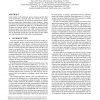Free Online Productivity Tools
i2Speak
i2Symbol
i2OCR
iTex2Img
iWeb2Print
iWeb2Shot
i2Type
iPdf2Split
iPdf2Merge
i2Bopomofo
i2Arabic
i2Style
i2Image
i2PDF
iLatex2Rtf
Sci2ools
100
click to vote
ICCAD
2003
IEEE
2003
IEEE
Analytical Bound for Unwanted Clock Skew due to Wire Width Variation
Under modern VLSI technology, process variations greatly affect circuit performance, especially clock skew which is very timing sensitive. Unwanted skew due to process variation forms a bottleneck preventing further improvement on clock frequency. Impact from intra-chip interconnect variation is becoming remarkable and is difficult to be modeled efficiently due to its distributive nature. Through wire shaping analysis, we establish an analytical bound for the unwanted skew due to wire width variation which is the dominating factor among interconnect variations. Experimental results on benchmark circuits show that this bound is safer, tighter and computationally faster than similar existing approach.
| Added | 16 Mar 2010 |
| Updated | 16 Mar 2010 |
| Type | Conference |
| Year | 2003 |
| Where | ICCAD |
| Authors | Anand Rajaram, Bing Lu, Wei Guo, Rabi N. Mahapatra, Jiang Hu |
Comments (0)

